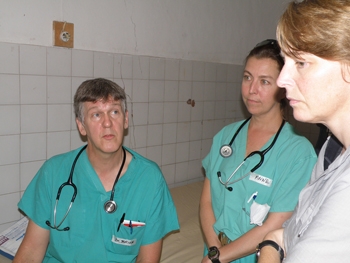
Partners in Health President and Executive Director Ophelia Dahl (right) visits with DHMC nephrologist Brian Remillard MD (left) DHMC nurse Anne Mrozik RN (center) at the Hinche Hospital in Haiti. (Photo courtesy Partners in Health.)
At 5 a.m. on January 21, kidney specialist Brian Remillard, MD, received a phone call from John Butterly, MD, the executive medical director at Dartmouth-Hitchcock Medical Center (DHMC), notifying Remillard that his medical expertise was needed in Haiti.
Six hours later, Remillard, section chief of nephrology and hypertension at DHMC, was on a flight to the earthquake-ravaged republic, surrounded by medical supplies, including a dialysis machine donated by manufacturer NXStage.
Since then, Remillard and critical care nurse Anne Mrozik, RN, have been performing kidney dialysis and working to establish the region’s first-ever dialysis center at a Partners in Health (PIH) clinic in Hinche, located on Haiti’s Central Plateau. Remillard and Mrozik are also teaching wound care and conducting training classes on the dialysis equipment with the local Haitian staff to ensure sustainability.
See more videos at Dartmouth’s YouTube channel, and more photos at Dartmouth’s Flickr photostream.
Mrozik has been in Haiti since January 19; she was originally a member of Dartmouth’s Team 2 assigned to Port-au-Prince, but was redeployed when Remillard arrived with the dialysis equipment.
“I’ve been working with the nurses and have done four classes with them on the dialysis machine,” says Mrozik, noting that their first dialysis treatment was performed Saturday, January 23. “We’ve also been teaching the nurses about IV solutions, dressing changes, and washing out wounds. They are accepting it very well, and we’ve seen some improvements in care, so that’s very encouraging.”
As a nephrologist, Remillard is highly experienced with kidney-related disorders and was called upon to offer assistance to severely injured patients suffering from what is commonly called “crush syndrome,” one of the chief causes of death after an earthquake. Crush syndrome is a form of acute kidney failure set off when limbs are crushed, and which often kills a high percentage of its victims.
The team says that conditions in Hinche have been challenging, especially the lack of basic equipment and supplies. Remillard resuscitated a baby suffering from extreme dehydration one night and, unable to use an IV on the child, was dismayed to discover that there were no baby bottles to easily give him some water. “It’s often a simple thing they don’t have,” Remillard says.
But Remillard and Mrozik are glad they can help provide care as well as instruction on much-needed medical equipment, especially in an area that previously didn’t have a dialysis machine.
“In this difficult time I think the staff and patients see it as a symbol of hope that the Haitian people will have a better future,” says Remillard. “Out of this terrible devastation, many new bridges are being built to help these courageous people. Anne and I are humbled to be part of that.”
“Dr. Remillard’s and Ms. Mrozik’s commitment to the needs of Haiti’s people and their adaptability and clinical skills that enable them to deliver highly technical, sophisticated care under extremely difficult, resource-limited conditions are remarkable,” says DHMC’s Butterly. “Even more important, however, is their dedication to transferring their knowledge and clinical skill to their Haitian colleagues to achieve a sustainable improvement in the well-being of Haiti’s population. We could not be more proud of them.”
The Dartmouth Haiti Response, a collaborative effort of Dartmouth College, DHMC, Dartmouth Medical School, and Partners in Health, is ongoing, with another Dartmouth team slated to depart early the week of January 31. Remillard and Mrozik return to the Upper Valley on Monday, February 1.
For more information:


